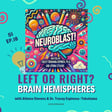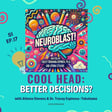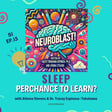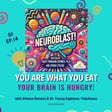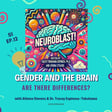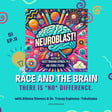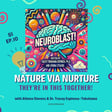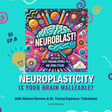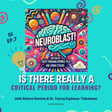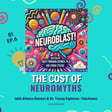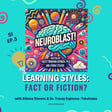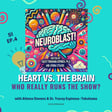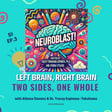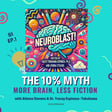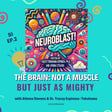Become a Creator today!Start creating today - Share your story with the world!
Start for free
00:00:00
00:00:01

Trauma: In Your Body and Your Brain
This Neuroblast episode debunks the myth that trauma is purely psychological. Athena and Tracey explain how trauma physically alters the brain and affects the body, leading to lasting health impacts. They advocate for trauma-informed care that addresses both mind and body to support true, holistic healing and recovery.
Original music by: Julian Starr
Transcript
Introduction to Trauma's Impact on Mind and Body
00:00:00
Speaker
Hi there, welcome to Neuroblast. bit of a different opening today. Today are talking about a difficult but crucial myth, that is the idea that trauma only affects the mind, and but not the brain and body. This misconception, I think everyone who is listening to us now probably has been on the receiving end of at least once
Tracy Tokohama Espinosa Joins the Discussion
00:00:30
Speaker
in their life. And so I'm joined by Tracy Tokohama Espinosa, who is a professor at Harvard our fellow professor
00:00:42
Speaker
famed in Neuroblaster, to really talk about the misunderstandings around corona and its true impact on our overall health.
00:00:54
Speaker
This episode is going to be Absolutely earth-shattering some of you. Hopefully not triggering for some of you, um but we will be talking about trauma in general and giving you a language and that might help you better understand what is going on.
Understanding Mind-Body Connection in Trauma
00:01:18
Speaker
Tracy, let's start with the basics. What do we mean as neuroscience people when we are talking about yeah then You're really getting into ah such an important topic, Athena, this whole idea about trauma and how we use the word trauma these days. In fact, I even had a TA last semester say, no, we have to talk about trauma, big T trauma and little t trauma. and And you start to get to these subtle understandings and notions. But at the very heart of it, it's understanding the impact of the mind and the body connection,
00:01:56
Speaker
and how there is reaction to external stimuli, the things that happen in our world, as well as this kind of anxiety we can generate within our inner world, and how that actually affects the body overall. And so understanding how experiences influence the way our mind and body interact is really at the heart of understanding trauma. And i think Initially, we really took a look at trauma thinking, oh, we think of trauma when we talk about hospitals, the the trauma and burn center, and we're always thinking about the physical element. And so when we talk about trauma, we tend to think of just, you know, well, maybe it's something external in your body.
00:02:35
Speaker
um And recently, we started to talk about trauma, oh, this is a psychological challenge that So we we're only talking about the mind, but what we really have to do is keep in mind this pairing, this coupling of the mind-body connection as we think through trauma and also how to treat it. Because sometimes we'll have those physical bodily triggers of trauma, but you can really do some control with your mind to actually get over it. And so linking the mind-body connection is a huge piece of understanding trauma.
Types of Trauma: Big T and Little t
00:03:08
Speaker
So just to clarify, we've got the physical trauma of an impact, a physical impact on the body, be it car crash.
00:03:20
Speaker
Use your imagination, agent you all can go there, but the physical impact of trauma, but today we're speaking about the trauma that impacts your psychology and the neurobiology, and that can be both big T trauma and little T trauma, but not the trauma that is an outside construct coming into contact with your body. Would you say that's a fair definition for today?
Challenges in Treating Mental Trauma
00:03:57
Speaker
Yeah, that's very good. And I would even use um maybe the concept, which might be familiar to some of the listeners, of traumatic brain injury, maybe as a bridge between these two ideas, right? Because we know that if you do have an assault to the brain and you do have damage there, that can lead to a type of a traumatic experience for your brain where your brain has actually been altered in its functioning because something has been damaged physically.
00:04:25
Speaker
Well, if we think about other types of trauma, you can have trauma that doesn't seem to be a physical assault on the body, but that can have an equally impairing effect on the mind or brain.
00:04:35
Speaker
And it's funny because I feel like I'm asking a bit of a silly question, but let's dive into it. The myth here is that the mental, emotional, psychological trauma affects only your mental, psychological, emotional health.
00:04:57
Speaker
And that is the myth we are tackling today. Why did this myth start? And... What is reinforcing it now?
00:05:08
Speaker
Well, oftentimes when you have mental trauma, there is no physical external bruise on your body, right? And so people say, well, I don't see it, but I don't know what you're talking about. And so we do have historically a real problem of treating mental illness or mental problems or traumas that are caused in a mental state.
00:05:27
Speaker
um It's not as easy as treating a physical trauma that you can actually see because what's going on in your mind is not there. A classic example is centuries ago, you know we labeled um women hysterical and we'd have hysterectomies and we'd you know that was a physical thing.
00:05:45
Speaker
That's the only connection we would make to a physical thing that had to do with external mental behaviors and we could fix that. And and that was labeling, saying let's let's give a physical part to something that might be a mental state.
00:05:58
Speaker
And what we found... Over the years, as you treat traumas, is that there is definitely a mind-body connection, but there's not always a physical space that you can point to, not a brain scan you can do to say this person has suffered trauma, which is really the difficult
Brain-Body Interaction in Emotions
00:06:14
Speaker
part. People want to see the physical evidence so that they can say, then we can treat this.
00:06:19
Speaker
um But that's not always a straightforward you know line between what a person is experiencing and then a physical part of the body or brain. And so um historically, we've had a hard time dealing with mental trauma in that way. And we're much better at dealing with physical trauma than we are with mental trauma.
00:06:36
Speaker
And hello how much do you think this is either perpetuated or spurred on by the Hidistic, which I basically call the mental shortcut of playing it down and going, it's not that that I've had words, my husband hits me, you're talking about feelings.
00:07:06
Speaker
Playing it down in that way. Yeah, exactly. People, um because they can't feel it, it's very hard to treat it It's very hard to accept what somebody may be going through um internally and mentally.
00:07:20
Speaker
And one huge indicator that it's started to turn the page on all of this, it's been a great help, is ah Looking at this huge new field of the neuroscience of embodied cognition and how your brain and body do work together, um sort of negotiating this emotional state. And emotions in the mind and body, and in the brain, are triggered by neurochemical exchanges that either have to do with neurotransmitters or hormones.
00:07:49
Speaker
that occur due to traumatic events or to any other emotional state. But basically understanding how your brain is sending a signal of either panic or worry or distress or depression.
00:08:02
Speaker
Those signals change the way your body reacts because there are different types of chemicals now being generated. you know transmitted throughout your body, telling you to run or freeze or whatever. And so the physical reaction is now helping people sort of give credence to the idea that this is actually a real problem. And it's sad that we've had to get to this stage where you get people actually committing external behavioral acts like, you know, a horrible self-harm or harm to others before their traumas are taken seriously.
00:08:38
Speaker
poor but they fall into deep, deep depressions before we take their trauma seriously. And so um trying to understand or marry this big idea um between emotional states and between understanding what's going on within the body and also legitimizing that people can feel and experience things that don't have to have, don't have to be visible to us.
00:09:02
Speaker
They're in that person and whether or not, I used to tell teachers when I was doing teacher training, it doesn't matter what you think you said to the students, it's how they perceived it.
00:09:14
Speaker
And so if the student comes and says, this teacher hates me, and I'll say, well, why do you think the teacher hates me? Because he said, and and I call the teacher, I'll say, why did you make this teacher the student feel this way? And the teacher will say,
00:09:27
Speaker
I just told them they're doing just fine. And so, and the student gets the message of what they perceived. They don't get the words that were said. And oftentimes, um and that's been a big lesson in my life. I always find that that it's it's very hard to make sure that you're conveying that understanding of empathy of what that other person may be going through um to legitimize that feeling, that interpretation of that emotional state. And that's very, very hard because it is not externally visible. We don't see it as an injury externally, which makes it hard for us to interpret what others must be feeling.
Role of HPA Axis in Stress Response
00:10:07
Speaker
And now we get into the crux of this, which is how trauma affects the brain. And to me, the...
00:10:19
Speaker
The most simple way to explain this is the HPA axis that we all have that explains a lot. So Tracy, tell us about this amazing HPA axis and how it changes both the brain and the body.
00:10:41
Speaker
So if we think very carefully, and remember I just mentioned this idea of emotional state. So basically what's going on in your your body is there is a perception of some kind of external stimuli that will trigger something. and let's Let's give a concrete example of of something like PTSD. so People who have experienced ah stressful states, they've had trauma in their life that then triggers these stressful states. PTSD is post-traumatic stress syndrome. And what's so interesting is that stress and anxiety are highly related, but they're different, actually, in different orders of how they occur in your brain. Stress is typically stimulated by an external stimuli, um reliving an experience or remembering you know that you pass down the...
00:11:28
Speaker
a dark alleyway and remember the time you were jumped or something like that, there's triggers that occur from your external environment. But what really is the most damaging element of this is that you see that the anxiety that that triggers, that internal rumination about that particular problem over and over um circulates. And so when you talk about the HPA, there's there's a lot of elements elements or spaces or structures in the brain.
00:11:55
Speaker
But what's different about stress and anxiety is that actually the order of where things occur is actually slightly different and so are neurochemical exchanges, which is why you treat ah stress and anxiety slightly differently with medications, for example, if you're if you're looking at things like that. And so We know that your brain is perceiving the world.
00:12:15
Speaker
The first signal that enters your brain goes up through the brainstem. You've had all these external stimulations. And all of a sudden, the first stop that your brain, that that youre that that signal makes in your brain is to check with memory systems. so And those are two key hubs. The two key hubs for memory have to do with amygdala and the hippocampus.
00:12:34
Speaker
And the amygdala is that first, you know, but that's through that's ah a key passageway, a key hub through which emotional memories are processed. And that is helpful for survival because it tells you, oh, my gosh, this is just like the other situation run or something like that, right?
00:12:51
Speaker
um But then it goes quickly, frontal lobe back to your hippocampus, and then for a double check, you know, what do I really know about this long-term memory-wise? And so your memory systems are huge in understanding this this area of trauma. And that's a huge area of research as well because we're trying to understand some people, and I don't agree with this, some people want to suppress that access to memories that triggers the trauma.
00:13:18
Speaker
Other types of therapy say, face your fears and let's deal with this and then
Trauma Therapy Approaches
00:13:23
Speaker
move on. So there's different ways of processing the way your brain or understanding how your brain takes in these triggers that stimulate a reliving of these traumatic experiences. And I just don't have any idea to make it more concrete for our listeners.
00:13:39
Speaker
um So you see a brown wiggly thing on the ground and your brain sees it. And basically what's happening currently is wrong is two messages get sent the same time. The first one is to the amygdala, which goes, snake.
00:14:06
Speaker
And the the second one is, to the canvas, which takes a split second longer, that goes, snake? Question mark. And so it's that difference between the exclamation point snake and the question mark snake that is being processed almost at the same time.
00:14:32
Speaker
Is that correct? Excellent, yes. And just because of the physical structures of the brain, what's kind of crazy is that it is it's last it's a split well split it split second, but first um is the reaction, is the medulla, which is really interesting because it does it's self-preservation, and it's better to you know be safe than sorry. And so it's better to jump away and think it's a snake.
00:14:55
Speaker
and then then confirm, oh, it's not a snake, then vice versa. And so basically these emotional reactions are things that will happen um slightly faster, right? And so our...
00:15:09
Speaker
Triggers based on traumas that we may have experienced in our lives can be stronger, weaker, and they can sometimes be overridden just simply by, you know, the logical explanation that you just gave right now.
00:15:21
Speaker
Or they take a long time to work through because they have been really ingrained. You're... Memory, you're basically, I take in the stimuli, my brain is reacting to something, this is the behavior I show.
00:15:35
Speaker
It's very, very hard to get over these traumatic experiences. And and as I say, the way that people, there's such such a huge range of schools of thought about how you do this. But I remember having several war veterans who who took my class once upon a time. And one fellow...
00:15:54
Speaker
I said, well, what do you want to know in this class and why? And he said, I just want to know why it's so much easier. How come people are really willing to throw drugs at me than just to let me talk? And he says, if I just talk about this, I think I can get over this. But they'd rather suppress my access to those memories through drugs than to work it out. So these are just two different ways or philosophies actually about approaching how do you treat
Brain Processing and Chemical Reactions to Threats
00:16:22
Speaker
trauma. And so um physiologically speaking in the brain, what you're truly trying to do is to have that initial reaction be toned down a bit and that you understand this is why other types of um
00:16:35
Speaker
treatments, for example, the veterans are actually experimenting with virtual reality. They make the vets actually relive the traumatic experience and then have a choice. Okay, now what do you do after this? Or what could, do you see you couldn't have done anything else? Do you see that, you know, they they face those things. So that's another extreme. So one thing is suppressing access to any of those memories. The other thing is actually enhancing those memories to sort of deal and sort of say, now I've now i've put that to rest.
00:17:09
Speaker
There's a lot of different approaches, which is why it's so confusing when people have traumatic experiences and they get all kinds of mixed advice. It's because they we don't know. We don't know the very best way to treat trauma.
00:17:22
Speaker
And it all depends on this huge range and the gamut of what we call trauma. People can experience early childhood trauma, sexual trauma. They can experience trauma that has to do with um physical, maybe falling off a horse and then having their life change in that way. but there's Or they can go to war. There's a huge range of trauma and people are different. And so they react to these different types of therapeutic interventions in different ways.
00:17:48
Speaker
So the reason why I went with Snake is that we are evolutionarily engineered trauma. to see a brown, wiggly thing on the ground and jump.
00:18:01
Speaker
That's like when you see something out of the corner of your eye that you breathe. instantly computes as a threat, you jump it, and then, oh, it's, you know, my friend or my dog or whatever.
00:18:16
Speaker
the brain receives this by two ways. You might have the initial jump if it is something quite physical, but then you get they hit the hippocampus involved. And can we just follow from...
00:18:32
Speaker
be hither know I don't know why I'm pointing to my head. It's not like I can actually point to my hippocampus. But can we just follow message that is received to the hippocampus?
00:18:48
Speaker
It is a threat, considered a threat by the brain. And then happens chemically and physiologically?
00:19:00
Speaker
Let's talk about that HPA access loop. So when we have, so your brain is basically functioning at the at the very most fundamental level, electrically and chemically, right? We talk about electrical synapses or chemical but synapses, and that's what we're meaning when we say the signal travels through.
00:19:18
Speaker
So we're talking about these different networks through a perception and and the pathways that they follow. But what happens when that message is received and decoded in any way, correctly or incorrectly, is that then your body is going to receive other signals. So it's basically you've taken in information, your body is sending things up to the brain and vice versa. This is all one big mechanism together.
00:19:42
Speaker
But basically it sends a new message to say, okay, this means this is now this remains fearful, run. So you get a big burst of agenilin or something like that that will make you your physical body prepare for what's to come or what the next action should be, right? And so depending on what's going on in the brain, depending on what's happening in the external stimuli, you're going to have a different balance of these neurochemical exchanges, right? And so, for example, we know that...
00:20:13
Speaker
ah young children, babies, unfortunately, who might be abused from birth and smacked around a lot and have a high level of stress, this bath of cortisol, the stress hormones that they receive in their brain can actually do long-term physical damage to those poor children.
00:20:35
Speaker
even though they might get over the mental or psychological understanding that not everybody's going to come and smack them around. However, they've already suffered some kind of physiological damage to their brain that's going to change the way they react to the rest of the world forever. And so we know that trauma can have long-term effects because what's happening is you take in the stimuli, it's received by the brain, the perception of the brain sends out other chemicals back down to your body, which has your body react.
00:21:03
Speaker
And then it's a It's a constant back and forth, back and forth. And so this is a huge piece because part of other types of therapy are understanding this mind-body connection, this embodied connection to understand how you would actually manage that.
00:21:18
Speaker
If you perceive... Oh, my gosh, I've got this huge, you know, this feeling in in my stomach that I'm going to or at the end of my fingers, I want to punch somebody or or I want to run or something like that.
00:21:32
Speaker
Understanding what your body is doing mentally, i mean, in your brain, then can you. control that. How do you control that? And so other therapies basically say, what is your body telling you to do? Okay, now how do we change that? How do we change those chemical messengers so that you're actually thinking of physically responding in a different way?
Body's Balance Disrupted by Trauma Loops
00:21:53
Speaker
And so the real challenge comes into how do you actually, what do you do with those messages and how do you manage them? And then typically speaking, your body isn't going to stay in that state forever. But as we see in other cases of trauma,
00:22:09
Speaker
That loop doesn't stop. um So I think that maybe... but The loop of the baths of cortisol.
00:22:22
Speaker
That doesn't tell the body. Stress, reaction, more cortisol. And that's more adrenaline. then the body goes adrenaline, stress, reaction, reaction. That's the loop, right? Right. And that would be what you would hope. Now, this is what's so interesting is that what your body and brain naturally seek is homeostasis, is a balance, is coming back. And this allostatic load has to do with the balance of these neurochemical exchanges. And so,
00:22:59
Speaker
What would typically happen, and this is a problem with severe trauma or other types of of brain injuries, that um the loop would continue because what your body is normally going to do is, okay, wait, not a snake.
00:23:12
Speaker
Let's tone this down. Let's have less adrenaline. Let's, you know, whatever it is, they would find a balance to come back to this very um calm state again. But the difficulty is with some types of traumas that these things will continue looping and looping and looping and they never stop. So those high stress situations are are over time as opposed to what would be the natural state of the body is return to homeostasis, find its balance again and not be in that highly alert state.
00:23:43
Speaker
And I think just to clarify,
00:23:48
Speaker
Our bodies are prepared for these high-stress environments. And when I say high-stress, I don't mean simply working on Wall Street or being a lawyer.
00:24:02
Speaker
This can be as simple as... I said simple, if not simple, a difficult relationship.
Modern vs. Evolutionary Stress Responses
00:24:09
Speaker
And whereas before, adrenaline that is released is the point of that you processing between the mid-jula the was basically, the stress of that would be over within about 30 minutes.
00:24:32
Speaker
So within about 30 minutes, not only you know it's snake or snake, but you would also either be away from the snake or dead.
00:24:48
Speaker
Those are the two outcomes. And that is why the stress response engineered to work short term.
00:25:00
Speaker
but stress that you can get away from. Now, we record this, we're dealing with the national tragedy of the wildfires. I am sure when we record this again, there'll be another news cycle, and something equally awful is going on. and But even when you're away from that danger,
00:25:27
Speaker
you're still having to deal with these dress oh in intentcompanying the of emails, where am I getting my information, all of that. And so it doesn't, the snake doesn't go away in the same way it used to. There are more snakes coming up.
00:25:51
Speaker
your insurance rejects your claim for your house. That's another snake. oh And on and on it goes that you are not only not getting over things, but very often the initial trauma has subsequent other difficulties, complexities, people that you thought would be there that are not there that prolong this physiological chemical response.
00:26:25
Speaker
Is that fair? I think you're onto something. And I think what's really important is if we sort of tease apart the difference between what we mean when we talk about trauma, which tends to be relived through memories, and You're also describing situations in which people live under general conditions of high stress, which have to do with almost um intangible elements. The difference between the trauma and the stress points that you're mentioning is that trauma has a real clear, significant, and very specific type of a memory that that leads to these other triggers. But
00:27:05
Speaker
Stress in general can happen through ah huge range of things that that exist in your life. And that debility, being under high stress, can lead you to fall in to the consequences of having that traumatic experience.
00:27:19
Speaker
But it's not that...
Interactions Between Trauma and Stress
00:27:20
Speaker
I would tease them apart because I do think it's important that one can exacerbate the other, but it's not exactly the same lived experience. a traumatic and Having trauma in your life versus the constant daily stress...
00:27:33
Speaker
of being faced with you know fake news or natural disasters or things that may feel out of your control, the reason it's important to tease those three two things apart is because they're treated differently.
00:27:47
Speaker
and And I always say a good diagnosis is half the cure. If we realize that somebody is experiencing something due to trauma, you do different types of therapeutic interventions versus somebody under high stress ah which might be if we're saying we're just over-connected in the world and we're getting ah conflicting ideas and opinions and too much bad news, well, maybe you just disconnect a little bit or something. There's different responses to things. um And the stress points, though, tipping into those stress points can then re-trigger the traumatic experience. So just know that they're highly related, but they're not necessarily identical situations.
00:28:29
Speaker
So trauma can very often lead you into high and prolonged stress points. Yes, and and living in highly stressful situations can revive the traumatic experience.
00:28:45
Speaker
And so, yeah, they're there they feed off of each other and in very negative ways. And ah I just wanted to add this. When we talk about It's not just in your mind. Here's something unbelievably fascinating, but I know it to be true myself because I did this about a year ago. Cortisol levels can be detected your hair.
00:29:18
Speaker
And in your saliva. But in your you can track it over time. So you can Take a hair sample, send it to a lab, and did the lab can say, six months ago your cortisol level was this.
00:29:38
Speaker
Now but it is this. That's a big difference one way or the other. this is why very often we get stressed. you can see it in your hair first and foremost between anything else or before anything else, particularly if you have short hair.
00:29:58
Speaker
ah So it really does come out in even cosmetic ways. There's a reason when we had the old adage teenagers are under lot of stress, so stress, so it broke out.
00:30:17
Speaker
But these chemical baths are constantly changing what's going through your body in were made in and and your body digests food, how it feels, pain, all of that.
00:30:34
Speaker
Yeah, you're absolutely right. And this is also why, as we said, this huge connection between the mind and the body or the brain and the body is not completely and you know well understood, but we know that it does manifest itself within bodily things, exactly like we mentioned before another week, sleep problems, eating problems,
00:30:54
Speaker
um All of these things are related to when somebody is under high stress. You're absolutely right. And so, and reliving traumatic experiences, having those things come back also disturb things in the brain and body connection, especially as it relates to just general health and wellbeing. We know that having... um Chronically stressful situations, there's a huge and deep dive now being taken into just the understanding of inflammation and tissues and what is this doing in the brain and body and how does this have an impact on general health and well-being. And so um we know that these mental states affect the physical body and vice versa. what's been what has been What has happened to the body affects the brain as well. And so keeping that in mind and keeping... um
00:31:43
Speaker
it's we tend to think of things as symptoms right okay so oh you're not sleeping well because you're having these recurring memories about that traumatic experience or something um that's true but they feed off of each other right it's this big loop here and so those dreams can be so vivid that they actually reignite the traumatic experience and all the rest of that and so trying to understand um ways Best ways of intervention. I mean, in general, we want to know what something is, what caused it.
00:32:14
Speaker
A good diagnosis is half the cure, right? And then you look for ways that you can have interventions. But I think what you're bringing up puts an emphasis on all of that is the long-term effects of not dealing with trauma, the long-term effects um can be highly negative to both brain and body.
00:32:34
Speaker
we are meant to be full-body people, that this disconnect we try to make happen in between ah brain and our body is just not possible. yet by ignoring full-body experience ramifications of life,
00:32:58
Speaker
travel we are leaving people without the full support they need to
Holistic Treatment of Trauma
00:33:05
Speaker
heal. um yeah so acts and points What do we do about it?
00:33:11
Speaker
Well, I think the very first one has to do with what you just said right now. um A good friend, ah Mary Helen Mordino Yang, always tells people, well, we're not just talking about brains in buckets. You know, people live in context, right?
00:33:23
Speaker
Well, I would also say you're not just talking about, you know, minds on a couch when you're trying to treat something like trauma. You really have to look, as you're saying, at at full body um changes. And sometimes people find that being encouraged to take a different approach to their diet or sleeping or other types of physical habits for their body benefits their their mind as well. So we we know that.
00:33:47
Speaker
But also therapeutic interventions. um There's a huge... very interesting amount of studies coming out of of the whole COVID experience when people couldn't go visit therapists and they talk to people online, just actually talking about that traumatic experience out loud changes the experience. And so it's very, very important to see how even almost anonymously talking to somebody you don't even know, but actually giving words to that emotional state,
00:34:17
Speaker
can benefit your beginning to treat that um in yourself, to acknowledge where things are happening and and what triggers what and how your body is reacting to those traumatic memories. And so, um yeah, I think the huge, the biggest takeaway is to first understand you're right, that we have to think about this as a mind-body problem. Trauma is not just something in the mind. It's not just something in the body. It's something that you have to treat whole bodily. And that is a huge first step.
00:34:45
Speaker
hearing about language, there is a reason why we call it unspeakable trauma giving language to trauma.
Language and Processing in Trauma Healing
00:34:55
Speaker
And as a storyteller, on a personal note, that is music to my ears.
00:35:03
Speaker
I definitely know that through the power of stories and language and Listening to podcasts like these, I've been given a language to explain what's going on inside me, and that me down hugely.
00:35:23
Speaker
So, with that in mind, thank you all for joining us on NeuroBlas today. This barely a scratch on the surface of something that is much deeper and many more brilliant minds than ours are looking at this topic. But hopefully we gave you some keywords like cortisol, HPAXs,
00:35:52
Speaker
even big T-trauma, little T-trauma and stress, so that you can start putting together what is happening within your and body and get yourself out of that evolutionary cycle.
Caring for Others in Trauma Recovery
00:36:14
Speaker
I would also just add, Athena, one last point to that caring for others is a really great therapeutic intervention. And understanding yourself, um it's it's very, i would we're talking a lot about how to self-focus and self-cure, but I think half of the cure comes from those around you.
00:36:30
Speaker
And your reaching out to other people who you might perceive are undergoing you know the negative repercussions of having traumatic events is also beneficial to you. So there's there's a ah win-win situation there. So take care of the people around you, I would say.
00:36:44
Speaker
Indeed. Thank you all so much for listening to Neuroblast. If you found this episode helpful or think it would help someone else, please share it with friends.
Conclusion and Call to Action
00:36:57
Speaker
And don't forget to like and zi subscribe to help us out because it really does. Also, Neuroblast is produced by Aegis Productions with music by Julian done probably change your brain, but understanding it can be a first step to help us heal.
00:37:23
Speaker
Thank you so much, and we'll see you next week. Thank you.

